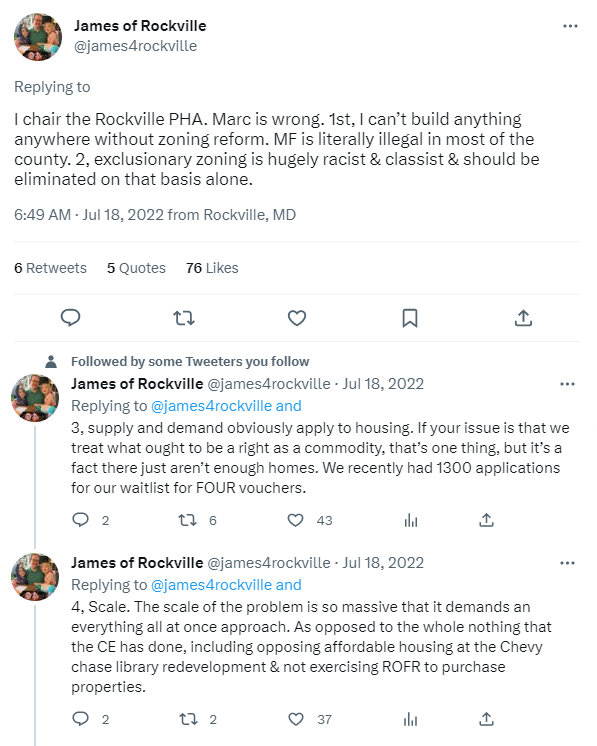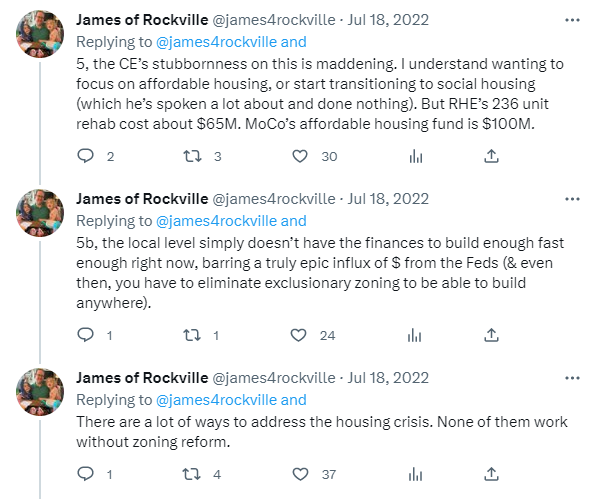By Adam Pagnucco.
On one level, County Executive Marc Elrich’s veto of James Hedrick’s planning board appointment was part of a struggle for control of the board that has been going on for months. On another level, this is also about the balance of power between the executive and legislative branches.
Elrich is taking a lot of heat from Hedrick’s supporters, who have been pouring derision on him all weekend. But let’s recognize that Elrich did not cause the tumult on the board. That started because of a civil war between planning board members that culminated in the firing of the planning director and a mass resignation forced by the county council. Let’s also note that Elrich voted against the appointment of former planning board chair Casey Anderson, so to the extent that Anderson had any responsibility for the board’s problems, that’s not on Elrich.
Elrich has been asking for a larger role in planning board appointments for months. He said this publicly on this site on October 12 and October 19. He also supported two bills by Senator Ben Kramer that would have given the executive more power over Park and Planning’s board and functions. None of this is surprising considering that Elrich has built his political career on land use issues for more than 30 years.
It’s also not surprising that he would veto Hedrick. I can’t speak to Elrich’s characterization of Hedrick’s temperament and social media statements. But consider Hedrick’s responses to Greater Greater Washington’s questionnaire. His positions included:
Wanting to build more than 100,000 housing units by 2040, a larger number than the planning department’s target of 60,000.
Support for the recently passed Thrive 2050 development plan.
Support for legalizing duplexes countywide.
Support for eliminating housing moratoriums in areas with crowded schools.
And then there was this exchange.
Question from GGW: “The Moderately Priced Dwelling Unit (MPDU) program requires that at least 12.5% of homes in a new residential development with at least 20 homes be set aside as affordable homes. The cost of doing so is paid by a project’s developer. Because the number of MPDUs is tied to the number of total units, the larger a development is, the more MPDUs will be built. Conversely, if the initial density proposed by a developer is reduced during the approvals process, rather than maintained or increased, fewer MPDUs will be built. Planning Board commissioners are likely to hear from some constituents concerned by a project’s potential impact—real or assumed—on traffic, parking, views, and property values and rents, and whether it fits the character of the neighborhood. If a development with MPDUs came before you, what would you do, given the likelihood of at least some pushback?”
Answer from Hedrick: “I would encourage developers to maximize the height and density of the project.”
Hedrick’s positions were not so different from those of Mitra Pedoeem, whom Elrich did not oppose. But combine them with (according to Elrich) a contentious meeting and some tough tweets by Hedrick and that adds up to a veto.


Hedrick attacks Elrich on the day before last year’s primary.
As I printed on Friday, Hedrick was appointed with 8 votes from the council and state law requires 9 votes to override an executive veto of a planning board appointment. That gives Elrich leverage and it puts Council Members Will Jawando, Kristin Mink and Laurie-Anne Sayles, who voted for former procurement director Cherri Branson instead of Hedrick, in the driver’s seat. One or more of these council members will decide the issue. What’s their price?
As for Elrich and the council, let’s remember how county councils work. Council members don’t directly deal with their county executive on a daily basis but they do deal with each other constantly. So councils tend to become insular institutions, paying far more attention to the inside of their building than to the folks “across the street.” Every now and then, executives – and not just Elrich – have stepped in to remind the council, “Hey, I matter and you need to deal with me.” The result can be negotiation or conflict.
We shall see shortly how this proceeds.
